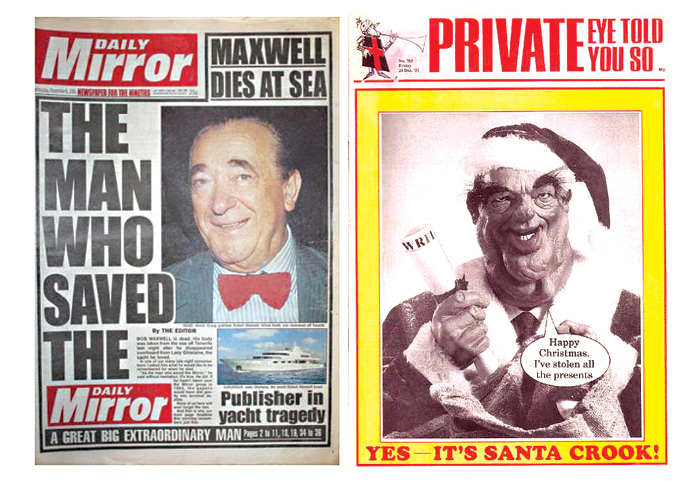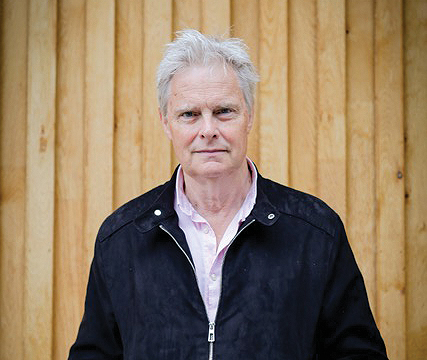Captain crook
A new book about media giant Robert Maxwell unearths some unpleasant memories for Peter Gruner
Thursday, 18th March 2021 — By Peter Gruner

Left: How the Daily Mirror broke the news of Robert Maxwell’s demise (before they knew he’d raided their pensions); right: How Private Eye reported the news
BRITAIN’S first ever left-wing workers’ co-operative daily newspaper was desperately in need of funds when a certain entrepreneur and former Labour MP, with a rather bizarre Churchillian accent, came bounding to the rescue.
This was the late summer of 1975, almost 50 years ago, but I was painfully reminded of the event while reading John Preston’s fascinating new book Fall: The Mystery of Robert Maxwell.
The book chronicles the extraordinary life of Maxwell, who among other better-known ventures took over the Glasgow-based workers’ co-operative the Scottish Daily News, which I worked for during its brief existence.
Born of Jewish parents in Czechoslovakia in 1923, Maxwell grew up in poverty, one of nine children, escaped the Holocaust, fought against the Nazis during the Second World War and won the British Military Cross.
He was Labour MP for Buckingham from 1964 until 1970, and later became a well known newspaper tycoon and multimillionaire, purchasing the Daily Mirror in 1984 when it was based in High Holborn.
A larger than life figure – literally, he weighed 22 stone at death – he was admired by many, including former prime minister Margaret Thatcher. Then came bankruptcy and finally his strange death in 1991.
He was found floating in the Atlantic, after being aboard his yacht, Lady Ghislaine. Did he fall or was it suicide? No one knows.
I was an impressionable 28-year-old in 1975, when I decided to leave my steady job on the Tottenham Weekly Herald – despite warnings from colleagues – and head up to Glasgow to offer my services to the new Scottish Daily News. I became one of a large group of eager, mainly left-thinking journalists who saw themselves bringing about… er, social change.
The truth was of course I was rather enjoying the Glasgow nightlife, not to mention the rowdy pub scene.
The paper, which had been going for six months, was established by up to 500 former Scottish Daily Express staff who had been made redundant after the SDE moved from Glasgow to Manchester.
Naively we imagined that Maxwell, whose voice regularly boomed out, barking orders and ideas from Tannoys around our offices, would be the paper’s saviour.
Quite the opposite, of course.
The paper closed not long after he arrived, resulting in most of the staff, including me, going on the dole.
It was said there were acrimonious relationships between Maxwell and some of the more ideologically driven staff.

John Preston. Photo: Justine Stoddart
Preston’s book doesn’t mention the SDN, but he delves deeply into the saga of Maxwell’s life, including his taking over of the Daily Mirror and then later, unforgivably, plundering the staff pension funds.
When elected to Parliament Maxwell was already a rich and successful businessman with a reputation for eccentricity bordering on outrageousness.
However, he needed to change his image. He liked to be called “Captain” but he dropped that in case it smacked of elitism. He also changed his Rolls-Royce for a battered old Land Rover.
In the Commons he was regularly on his feet giving speeches and upsetting other members including the then Labour prime minister Harold Wilson. Political diarist Richard Crossman MP wrote of Maxwell: “However much people hate him, laugh at him, boo him and call him a vulgarian, he really does get things done.”
After losing his seat in 1970 Maxwell decided he had to buy to buy a Fleet Street paper. His chance came in 1984 when he made a formal offer of £80,000,000 for the Mirror.
The news was greeted with horror by the then owners Reed International, Preston writes.
“Immediately, they turned the offer down, at the same time making it clear that they would rather put their families on the street than sell to Maxwell.”
But the deal was agreed and at last Maxwell could go toe-to-toe with his greatest rival, Rupert Murdoch.
Under the slogan, “Who Dares Wins,” Maxwell saw himself as a “kind of international superhero, jetting round the world dispensing money and advice as he saw fit”.
Maxwell not only rewrote articles: he chose photographs – frequently of himself – and commissioned pieces extolling the virtues of places where he had, or hoped to have, business interests.
He was also famous for his food intolerances. While garlic and onions topped his list of dislikes, he did not care for small apples or oranges – or indeed for small anything. In most instances, the largest sized fruit available should be sent of the best quality. Sliced brown bread should never be buttered. Similarly, no butter should ever be used in cooking – peanut oil may be used as an alternative. On no account was deep-fried fish ever to be served.
Shortly after buying the Mirror Maxwell told one of his new employees that he owned the pension fund. Strictly speaking, he was right, writes Preston. At the time this arrangement didn’t appear to cause anyone any disquiet.
But later the day-to-day running of the fund would be squirrelled away in Liechtenstein, where it was safe from scrutiny.
It was only when he had died that the full financial horror was realised.
After his death Mirror Group shareholders were wiped out, but arguably the biggest losers were the pensioners, who had £460m looted from their fund, although there was a partial government bailout and money from the investment bankers who advised Maxwell.
Despite the acute stress and losses the Association of Mirror Pensioners survives.
Preston writes: “Perhaps all this mess could have been avoided had the people dealing with Maxwell heeded the words of the government investigation of the shadowy dealings at Pergamon (one of his companies) in the 1970s, which concluded, ‘he is not in our opinion a person who can be relied on to exercise proper stewardship of a public company’.”
• Fall: The Mystery of Robert Maxwell. By John Preston, Viking, £18.99.